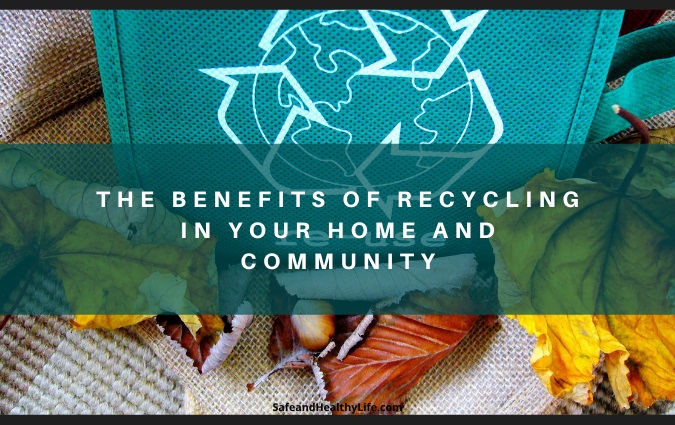
Recycling refers to the process of collecting and processing waste and turning them into useful products.
According to the Environmental Protection Agency, Americans generate 300 million tons of waste every year. Unfortunately, only 32% of this waste gets recycled.
The rest is either burned or ends up in landfills across the country. Burning or burying waste pollutes the environment.
This is why you need to do your part though home recycling. This article looks at the benefits of recycling in your home or community.
1. Cuts Greenhouse Emissions
Greenhouse gases trap heat in the atmosphere causing global warming. Carbon dioxide is the most common pollutant. Current carbon dioxide levels are the highest they have ever been. It is estimated that the CO2 levels have reached 408.98 parts per million (ppm).
Most carbon dioxide is produced from the burning of fossil fuels. Burning your waste only adds to this problem.
Practicing home recycling reduces the amount of waste per household. This translates to less burning of waste and different facilities.
Consequently, fewer gases are emitted into the environment. Recycling materials like glass and metals also reduces the number of fuels used by processing plants. More on this is covered below.
2. Conserves Natural Resources
Industrial processes rely on natural resources such as minerals and wood as raw materials. Unfortunately, extracting these resources from the earth often harms the environment.
For instance, mining earth metals can have devastating consequences. It can cause sinkholes, erosions, soil contamination, and the release of harmful chemicals into the atmosphere.
Sadly, as the global population swells, the demand for such items also increases. Although the world still needs these products, we reduce the number of raw materials used during production.
Using waste paper as raw materials reduces the need for cutting trees. Likewise, recycling glass or metals reduces the need to mine more minerals.
3. Creates Jobs
Recycling isn’t just good for the earth. It puts food on the table for many families. There are a lot of green industries that fully depend on recycled materials as their raw materials.
To keep a steady supply of materials, they employ people to collect, prepare and process the recycled materials. You can start a collection center in your community and sell the waste for extra money.
Although Americans only recycle a fraction of their wastes, it creates more jobs than waste collection and disposal.
According to the EPA, recycling creates 68,000 jobs and provides $37.8 billion in wages every year. This total combines collection, manufacturing, and reuse. The good news about home recycling is that anyone can make money from it.
Numerous sites offer cash in exchange for recyclable materials. Common materials accepted include used textbooks, old newspapers, empty bottles, and cans. You can also turn old electronics such as computers, printers, and cartridges into money.
The best part is some sites do all the work for you. They will collect it and ship it. It’s the easiest money you’ll ever make.
4. Protects The Ecosystem And Wildlife
Most of your home waste either ends up in the air or the soil. Both destinations are detrimental to the ecosystem and the wildlife.
Plastics, in particular, are a serious problem for marine animals. It is estimated that about a million seabirds and 10 000 marine mammals perish each year due to entanglement or ingestion of plastic debris.
Similarly, air pollution from the burning of wastes can affect ecological resources like water and soil. The result is stunted growth in plants or total extinction of some plant species.
Animals that depend on the vegetation for food are often left vulnerable. Home recycling reduces the amount of waste that ends in the ocean or the atmosphere. The result is purer air and cleaner oceans and beaches.
| Read also: How Do Environmental Toxins Affect Your Health? |
5. Saves Energy
There is a growing concern that the energy demand by industries is straining the limited natural resources. Despite advancement in renewable energy production, 79.7% of the American energy needs is supplied by fossil fuels. Only 11% of the electricity is generated from renewable sources.
Industries use a lot of energy to convert raw materials into final products. The good news is that you can reduce this demand through home recycling. It may not seem like it, but it makes a huge difference.
For instance, making aluminum for recycled cans uses 95% less energy than making it from scratch. The same savings are made when recycling glass bottles and used paper.
Final Thoughts
Hopefully, this article inspires you to start recycling in your home and community. Home recycling makes a difference, no matter how small.
Fortunately, it is easier today than it was decades ago. There are waste management companies that specialize in recycling.
You can turn to the several websites that pay for recyclable materials like glass, scrap metal, electronics, and paper in their absence. You don’t have an excuse. Do you part, start home recycling today.
About The Author:
Casey Johnson – is a freelance journalist and health advocate from Long Beach, CA. A graduate of UCLA, Casey enjoys her love of the outdoors, jogging, yoga, and spending quality time with her dog Riley. She strives to create content that is both insightful and action-oriented.

![[Infographic] Helping Your Child Understand The Importance Of Community Encouraging-community-involvement-in-children](https://www.safeandhealthylife.com/wp-content/uploads/2023/10/Encouraging-community-involvement-in-children-2-150x150.webp)


